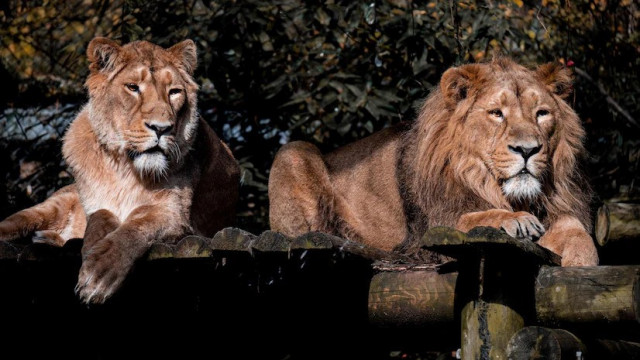Caged by faith: Muslim lion, Hindu lioness can't live together in zoo until Indian court says so
Proceedings at Calcutta High Court began on February 21 to determine whether the two lions should undergo name change

In a peculiar turn of events, the Calcutta High Court has become the stage for a legal battle over the names of two lions at Bengal Safari Park after the Vishwa Hindu Parishad (VHP), a Hindu nationalist organization affiliated with the ruling Bharatiya Janata Party (BJP), objected to the names of the big cats.
According to Al Jazeera, the controversy centres around a lioness named Sita and a lion named Akbar, the latter's name triggering the outrage. The VHP, arguing that it is blasphemous for Sita to share an enclosure with a lion named after the 16th-century Mughal emperor Akbar, filed a petition demanding a name change.
The VHP alleges that Akbar was initially named Ram, after a Hindu deity and Sita's husband, and was renamed by West Bengal authorities. This claim is denied by the state authorities, who insist that the lions arrived with their names from an exchange program involving Sepahijala Zoological Park in Tripura, governed by the BJP.
Anup Mondal, an official from VHP, expressed the sentiment, stating, “Sita cannot stay with the Mughal Emperor Akbar.” The VHP cited complaints from across India about hurt religious sentiments, leading to the legal petition filed by VHP’s West Bengal secretary Lakshman Bansal.
Following the petition, the lions were moved to separate enclosures to prevent any perceived religious conflict. This move, seemingly driven by Hindu nationalist sentiment, sparked concerns about the potential implications on court precedents and religious sentiments.
The controversy has taken an unexpected turn with some Hindu majoritarian groups now introducing the concept of "love jihad" into the narrative. Love jihad is a conspiracy theory that accuses Muslim men of attempting to convert Hindu women to Islam through romantic relationships.
As reported by The Indian Express, the Calcutta High Court began hearing the case on February 21. The proceedings delved into whether the two lions should undergo a name change, sparking discussions on religious sentiments and naming conventions.
During the hearing, Justice Bhattacharyya questioned the significance of naming the lioness Sita and whether it was an expression of affection. The counsel for the petitioners argued against this interpretation, asserting that it was a form of slander rather than affection. An analogy was drawn, suggesting that if such naming practices were allowed, even a donkey could be named after a deity.
The court also raised questions about the admissibility of the case, inquiring why the petitioners did not file a Public Interest Litigation (PIL) since they claim to represent an organization and aim to safeguard broader religious sentiments. The ambiguity surrounding the individuals responsible for naming the lions prompted the court to request clarity from the state government on the matter.
On February 22, the government informed the court that Akbar and Sita were designated as "house names" for the animals in the Tripura Zoo. The government argued that the petition was not maintainable as it did not adhere to the form of a PIL.
In the subsequent proceedings, Justice Bhattacharyya extensively questioned Additional Advocate General (AAG) Debjyoti Choudhury on the acceptability of such naming conventions. The court sought clarity on whether animals could be named after freedom fighters and Nobel laureates and raised the hypothetical scenario of naming pets after figures from Hindu or Muslim religious backgrounds.
Have something to add to the story? Share it in the comments below.



















COMMENTS
Comments are moderated and generally will be posted if they are on-topic and not abusive.
For more information, please see our Comments FAQ